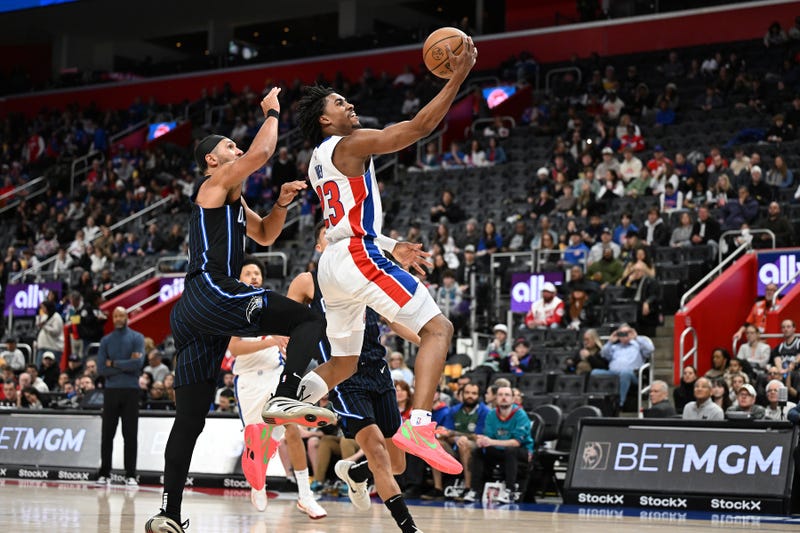
As the Pistons completed their exit interviews and closed up shop for the season, Jaden Ivey was still in the gym. It was Wednesday morning at the practice facility, almost a week since the Pistons were bounced from the playoffs. While Trajan Langdon addressed the media, Ivey was one floor below, grinding away in the weight room and on the court.
"His everyday approach to the game is something that if you’re not within these walls you just don’t know," Langdon said. "Very passionate, very competitive. He’s one of our hardest workers."
What Langdon called a "gratifying" season for the Pistons was grueling for Ivey. Fracturing his leg while playing the best basketball of his career was one thing. Spending the final four months of the season on the sidelines was another. Ivey endured two years of incessant losing with the Pistons, only to watch them start winning without him.
"This has been painful for him," Langdon said. "He’s an incredible human being, teammate. He’s been supportive, but it’s been hard watching our run and watching the playoffs knowing how competitive he is. He had an incredible first two months of the season and he helped this turnaround, so I’m excited to see what his summer looks like and what he’s going to look like coming back in the fall."
Ivey's name will be floated in trade rumors this summer that link the Pistons to All Star-caliber players. It already has been. At this point, it's nothing more than speculation. While Langdon originally omitted Ivey from a discussion of the young players who comprise the supporting cast for Cade Cunningham, he was likely just citing those who were top of mind for most of the season: Ausar Thompson, Jalen Duren, Isaiah Stewart, Ron Holland II. It sure sounds like Ivey is part of the plan, too.
And really, why wouldn't he be after the Pistons watched him reach a new level? After stagnating in year two under Monty Williams, the coach who presided over 28 losses in a row, Ivey leapt back into the picture under J.B. Bickerstaff. In 30 games starting next to Cunningham, he averaged 17.6 points and shot 40.9 percent from three, both career highs.
"His ability to shoot the ball was better than I thought coming in," Langdon said. "His ability to guard I think took a step from his previous two seasons to this year, his willingness to get up and impact the ball-handler. Those things, you could feel them when you’re watching the game, I think the guys he was guarding could feel it on the floor."
And on top of that, Langdon went on, "he gets to loose balls quickly, gets a lot of deflections, obviously can be a secondary scorer and primary at times. So I think he took a huge step this season. But just his overall competitive nature and professional approach were things that I didn’t understand when I first got here."
The Pistons were 14-18 this season before Ivey's injury, 30-20 after. Most of that was circumstantial: Ivey went down around the same time the Pistons were finding their identity under Bickerstaff. His injury did prompt the trade acquisition of Dennis Schroder, who proved invaluable down the stretch and into the playoffs. But Ivey's tools, coupled with his growth this season, make him the best candidate on the Pistons' roster to develop into a co-star with Cunningham.
They could have used one in the playoffs. While they gave the Knicks all they could handle, the Pistons lacked another playmaker in a series in which their final three losses came down to the last possession. But when asked if the Pistons are at a point where they need to add another star to the roster, Langdon said, "We need to learn more about our players. A big thing for this summer is going to be developing the young guys we have that are 19 to 23 years old."
"You can look at getting better through a different lens with a core group of this age than you would an older age," he said.
Ivey turned 23 in February, and he's already "a guy that impacts the game on both ends of the floor, and in between in transition," said Langdon.
"Adding him to the roster that we have will create an even more explosive dynamic and something else that our coaches and players can use to help us have even more success," Langdon said. "I think he’s going to come back a better version than he was this year."
At the time of his injury, Ivey was the Pistons' second-leading scorer. Malik Beasley held that mantle for the rest of the reason, shooting his way to 16.3 points per game off the bench. Beasley will likely return as a free agent, but it's an unknown as to who will be the No. 2 scorer next season on a team with obvious playoff ambitions. Langdon smiled when asked if he knows: "Nope."
"I think that's a good thing," he said. "I'm excited to see who that will be."
Ivey might have surprised Langdon this season. It shouldn't surprise anyone if he answers that question himself.
